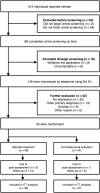Smartphone-Supported versus Full Behavioural Activation for Depression: A Randomised Controlled Trial
- PMID: 26010890
- PMCID: PMC4444307
- DOI: 10.1371/journal.pone.0126559
Smartphone-Supported versus Full Behavioural Activation for Depression: A Randomised Controlled Trial
Abstract
Background: There is need for more cost and time effective treatments for depression. This is the first randomised controlled trial in which a blended treatment--including four face-to-face sessions and a smartphone application--was compared against a full behavioural treatment. Hence, the aim of the current paper was to examine whether a blended smartphone treatment was non-inferior to a full behavioural activation treatment for depression.
Methods: This was a randomised controlled non-inferiority trial (NCT01819025) comparing a blended treatment (n=46) against a full ten-session treatment (n=47) for people suffering from major depression. Primary outcome measure was the BDI-II, that was administered at pre- and post-treatment, as well as six months after the treatment.
Results: Results showed significant improvements in both groups across time on the primary outcome measure (within-group Cohen's d=1.35; CI [-0.82, 3.52] to d=1.47; CI [-0.41, 3.35]; between group d=-0.13 CI [-2.37, 2.09] and d=-0.10 CI [-2.53, 2.33]). At the same time, the blended treatment reduced the therapist time with an average of 47%.
Conclusions: We could not establish whether the blended treatment was non-inferior to a full BA treatment. Nevertheless, this study points to that the blended treatment approach could possibly treat nearly twice as many patients suffering from depression by using a smartphone application as add-on. More studies are needed before we can suggest that the blended treatment method is a promising cost-effective alternative to regular face-to-face treatment for depression.
Trial registration: Cognitive Behavioral Therapy Treatment of Depression With Smartphone Support NCT01819025.
Conflict of interest statement
Figures
References
-
- Andrews G, Issakidis C, Sanderson K, Corry J, Lapsley H (2004) Utilising survey data to inform public policy: comparison of the cost-effectiveness of treatment of ten mental disorders. Br J Psychiatry 184: 526–533. - PubMed
-
- Boschen M, Casey L (2008) The use of mobile telephones as adjuncts to cognitive behavioral psychotherapy. Professional Psychology: Research and Practice 39: 546–552.
Publication types
MeSH terms
Associated data
LinkOut - more resources
Full Text Sources
Other Literature Sources
Medical





